- Home
- James S. A. Corey
Leviathan Wakes e-1
Leviathan Wakes e-1 Read online
Leviathan Wakes
( Expanse - 1 )
James S.A. Corey
James S.A. Corey
Leviathan Wakes
Prologue: Julie
The Scopuli had been taken eight days ago, and Julie Mao was finally ready to be shot.
It had taken all eight days trapped in a storage locker for her to get to that point. For the first two she’d remained motionless, sure that the armored men who’d put her there had been serious. For the first hours, the ship she’d been taken aboard wasn’t under thrust, so she floated in the locker, using gentle touches to keep herself from bumping into the walls or the atmosphere suit she shared the space with. When the ship began to move, thrust giving her weight, she’d stood silently until her legs cramped, then sat down slowly into a fetal position. She’d peed in her jumpsuit, not caring about the warm itchy wetness, or the smell, worrying only that she might slip and fall in the wet spot it left on the floor. She couldn’t make noise. They’d shoot her.
On the third day, thirst had forced her into action. The noise of the ship was all around her. The faint subsonic rumble of the reactor and drive. The constant hiss and thud of hydraulics and steel bolts as the pressure doors between decks opened and closed. The clump of heavy boots walking on metal decking. She waited until all the noise she could hear sounded distant, then pulled the environment suit off its hooks and onto the locker floor. Listening for any approaching sound, she slowly disassembled the suit and took out the water supply. It was old and stale; the suit obviously hadn’t been used or serviced in ages. But she hadn’t had a sip in two days, and the warm loamy water in the suit’s reservoir bag was the best thing she had ever tasted. She had to work hard not to gulp it down and make herself vomit.
When the urge to urinate returned, she pulled the catheter bag out of the suit and relieved herself into it. She sat on the floor, now cushioned by the padded suit and almost comfortable, and wondered who her captors were-Coalition Navy, pirates, something worse. Sometimes she slept.
On day four, isolation, hunger, boredom, and the diminishing number of places to store her piss finally pushed her to make contact with them. She’d heard muffled cries of pain. Somewhere nearby, her shipmates were being beaten or tortured. If she got the attention of the kidnappers, maybe they would just take her to the others. That was okay. Beatings, she could handle. It seemed like a small price to pay if it meant seeing people again.
The locker sat beside the inner airlock door. During flight, that usually wasn’t a high-traffic area, though she didn’t know anything about the layout of this particular ship. She thought about what to say, how to present herself. When she finally heard someone moving toward her, she just tried to yell that she wanted out. The dry rasp that came out of her throat surprised her. She swallowed, working her tongue to try to create some saliva, and tried again. Another faint rattle in the throat.
The people were right outside her locker door. A voice was talking quietly. Julie had pulled back a fist to bang on the door when she heard what it was saying.
No. Please no. Please don’t.
Dave. Her ship’s mechanic. Dave, who collected clips from old cartoons and knew a million jokes, begging in a small broken voice.
No, please no, please don’t, he said.
Hydraulics and locking bolts clicked as the inner airlock door opened. A meaty thud as something was thrown inside. Another click as the airlock closed. A hiss of evacuating air.
When the airlock cycle had finished, the people outside her door walked away. She didn’t bang to get their attention.
They’d scrubbed the ship. Detainment by the inner planets navies was a bad scenario, but they’d all trained on how to deal with it. Sensitive OPA data was scrubbed and overwritten with innocuous-looking logs with false time stamps. Anything too sensitive to trust to a computer, the captain destroyed. When the attackers came aboard, they could play innocent.
It hadn’t mattered.
There weren’t the questions about cargo or permits. The invaders had come in like they owned the place, and Captain Darren had rolled over like a dog. Everyone else-Mike, Dave, Wan Li-they’d all just thrown up their hands and gone along quietly. The pirates or slavers or whatever they were had dragged them off the little transport ship that had been her home, and down a docking tube without even minimal environment suits. The tube’s thin layer of Mylar was the only thing between them and hard nothing: hope it didn’t rip; goodbye lungs if it did.
Julie had gone along too, but then the bastards had tried to lay their hands on her, strip her clothes off.
Five years of low-gravity jui jitsu training and them in a confined space with no gravity. She’d done a lot of damage. She’d almost started to think she might win when from nowhere a gauntleted fist smashed into her face. Things got fuzzy after that. Then the locker, and Shoot her if she makes a noise. Four days of not making noise while they beat her friends down below and then threw one of them out an airlock.
After six days, everything went quiet.
Shifting between bouts of consciousness and fragmented dreams, she was only vaguely aware as the sounds of walking, talking, and pressure doors and the subsonic rumble of the reactor and the drive faded away a little at a time. When the drive stopped, so did gravity, and Julie woke from a dream of racing her old pinnace to find herself floating while her muscles screamed in protest and then slowly relaxed.
She pulled herself to the door and pressed her ear to the cold metal. Panic shot through her until she caught the quiet sound of the air recyclers. The ship still had power and air, but the drive wasn’t on and no one was opening a door or walking or talking. Maybe it was a crew meeting. Or a party on another deck. Or everyone was in engineering, fixing a serious problem.
She spent a day listening and waiting.
By day seven, her last sip of water was gone. No one on the ship had moved within range of her hearing for twenty-four hours. She sucked on a plastic tab she’d ripped off the environment suit until she worked up some saliva; then she started yelling. She yelled herself hoarse.
No one came.
By day eight, she was ready to be shot. She’d been out of water for two days, and her waste bag had been full for four. She put her shoulders against the back wall of the locker and planted her hands against the side walls. Then she kicked out with both legs as hard as she could. The cramps that followed the first kick almost made her pass out. She screamed instead.
Stupid girl, she told herself. She was dehydrated. Eight days without activity was more than enough to start atrophy. At least she should have stretched out.
She massaged her stiff muscles until the knots were gone, then stretched, focusing her mind like she was back in dojo. When she was in control of her body, she kicked again. And again. And again, until light started to show through the edges of the locker. And again, until the door was so bent that the three hinges and the locking bolt were the only points of contact between it and the frame.
And one last time, so that it bent far enough that the bolt was no longer seated in the hasp and the door swung free.
Julie shot from the locker, hands half raised and ready to look either threatening or terrified, depending on which seemed more useful.
There was no one on the whole deck level: the airlock, the suit storage room where she’d spent the last eight days, a half dozen other storage rooms. All empty. She plucked a magnetized pipe wrench of suitable size for skull cracking out of an EVA kit, then went down the crew ladder to the deck below.
And then the one below that, and then the one below that. Personnel cabins in crisp, almost military order. Commissary, where there were signs of a struggle. Medical bay, empty. Torpedo bay. No one. The comm station was unmanne
d, powered down, and locked. The few sensor logs that still streamed showed no sign of the Scopuli. A new dread knotted her gut. Deck after deck and room after room empty of life. Something had happened. A radiation leak. Poison in the air. Something that had forced an evacuation. She wondered if she’d be able to fly the ship by herself.
But if they’d evacuated, she’d have heard them going out the airlock, wouldn’t she?
She reached the final deck hatch, the one that led into engineering, and stopped when the hatch didn’t open automatically. A red light on the lock panel showed that the room had been sealed from the inside. She thought again about radiation and major failures. But if either of those was the case, why lock the door from the inside? And she had passed wall panel after wall panel. None of them had been flashing warnings of any kind. No, not radiation, something else.
There was more disruption here. Blood. Tools and containers in disarray. Whatever had happened, it had happened here. No, it had started here. And it had eneded behind that locked door.
It took two hours with a torch and prying tools from the machine shop to cut through the hatch to engineering. With the hydraulics compromised, she had to crank it open by hand. A gust of warm wet air blew out, carrying a hospital scent without the antiseptic. A coppery, nauseating smell. The torture chamber, then. Her friends would be inside, beaten or cut to pieces. Julie hefted her wrench and prepared to bust open at least one head before they killed her. She floated down.
The engineering deck was huge, vaulted like a cathedral. The fusion reactor dominated the central space. Something was wrong with it. Where she expected to see readouts, shielding, and monitors, a layer of something like mud seemed to flow over the reactor core. Slowly, Julie floated toward it, one hand still on the ladder. The strange smell became overpowering.
The mud caked around the reactor had structure to it like nothing she’d seen before. Tubes ran through it like veins or airways. Parts of it pulsed. Not mud, then.
Flesh.
An outcropping of the thing shifted toward her. Compared to the whole, it seemed no larger than a toe, a little finger. It was Captain Darren’s head.
“Help me,” it said.
Chapter One: Holden
A hundred and fifty years before, when the parochial disagreements between Earth and Mars had been on the verge of war, the Belt had been a far horizon of tremendous mineral wealth beyond viable economic reach, and the outer planets had been beyond even the most unrealistic corporate dream. Then Solomon Epstein had built his little modified fusion drive, popped it on the back of his three-man yacht, and turned it on. With a good scope, you could still see his ship going at a marginal percentage of the speed of light, heading out into the big empty. The best, longest funeral in the history of mankind. Fortunately, he’d left the plans on his home computer. The Epstein Drive hadn’t given humanity the stars, but it had delivered the planets.
Three-quarters of a kilometer long, a quarter of a kilometer wide-roughly shaped like a fire hydrant-and mostly empty space inside, the Canterbury was a retooled colony transport. Once, it had been packed with people, supplies, schematics, machines, environment bubbles, and hope. Just under twenty million people lived on the moons of Saturn now. The Canterbury had hauled nearly a million of their ancestors there. Forty-five million on the moons of Jupiter. One moon of Uranus sported five thousand, the farthest outpost of human civilization, at least until the Mormons finished their generation ship and headed for the stars and freedom from procreation restrictions.
And then there was the Belt.
If you asked OPA recruiters when they were drunk and feeling expansive, they might say there were a hundred million in the Belt. Ask an inner planet census taker, it was nearer to fifty million. Any way you looked, the population was huge and needed a lot of water.
So now the Canterbury and her dozens of sister ships in the Pur’n’Kleen Water Company made the loop from Saturn’s generous rings to the Belt and back hauling glaciers, and would until the ships aged into salvage wrecks.
Jim Holden saw some poetry in that.
“Holden?”
He turned back to the hangar deck. Chief Engineer Naomi Nagata towered over him. She stood almost two full meters tall, her mop of curly hair tied back into a black tail, her expression halfway between amusement and annoyance. She had the Belter habit of shrugging with her hands instead of her shoulders.
“Holden, are you listening, or just staring out the window?”
“There was a problem,” Holden said. “And because you’re really, really good, you can fix it even though you don’t have enough money or supplies.”
Naomi laughed.
“So you weren’t listening,” she said.
“Not really, no.”
“Well, you got the basics right anyhow. Knight’s landing gear isn’t going to be good in atmosphere until I can get the seals replaced. That going to be a problem?”
“I’ll ask the old man,” Holden said. “But when’s the last time we used the shuttle in atmosphere?”
“Never, but regs say we need at least one atmo-capable shuttle.”
“Hey, Boss!” Amos Burton, Naomi’s earthborn assistant, yelled from across the bay. He waved one meaty arm in their general direction. He meant Naomi. Amos might be on Captain McDowell’s ship; Holden might be executive officer; but in Amos Burton’s world, only Naomi was boss.
“What’s the matter?” Naomi shouted back.
“Bad cable. Can you hold this little fucker in place while I get the spare?”
Naomi looked at Holden, Are we done here? in her eyes. He snapped a sarcastic salute and she snorted, shaking her head as she walked away, her frame long and thin in her greasy coveralls.
Seven years in Earth’s navy, five years working in space with civilians, and he’d never gotten used to the long, thin, improbable bones of Belters. A childhood spent in gravity shaped the way he saw things forever.
At the central lift, Holden held his finger briefly over the button for the navigation deck, tempted by the prospect of Ade Tukunbo-her smile, her voice, the patchouli-and-vanilla scent she used in her hair-but pressed the button for the infirmary instead. Duty before pleasure.
Shed Garvey, the medical tech, was hunched over his lab table, debriding the stump of Cameron Paj’s left arm, when Holden walked in. A month earlier, Paj had gotten his elbow pinned by a thirty-ton block of ice moving at five millimeters a second. It wasn’t an uncommon injury among people with the dangerous job of cutting and moving zero-g icebergs, and Paj was taking the whole thing with the fatalism of a professional. Holden leaned over Shed’s shoulder to watch as the tech plucked one of the medical maggots out of dead tissue.
“What’s the word?” Holden asked.
“It’s looking pretty good, sir,” Paj said. “I’ve still got a few nerves. Shed’s been tellin’ me about how the prosthetic is gonna hook up to it.”
“Assuming we can keep the necrosis under control,” the medic said, “and make sure Paj doesn’t heal up too much before we get to Ceres. I checked the policy, and Paj here’s been signed on long enough to get one with force feedback, pressure and temperature sensors, fine-motor software. The whole package. It’ll be almost as good as the real thing. The inner planets have a new biogel that regrows the limb, but that isn’t covered in our medical plan.”
“Fuck the Inners, and fuck their magic Jell-O. I’d rather have a good Belter-built fake than anything those bastards grow in a lab. Just wearing their fancy arm probably turns you into an asshole,” Paj said. Then he added, “Oh, uh, no offense, XO.”
“None taken. Just glad we’re going to get you fixed up,” Holden said.
“Tell him the other bit,” Paj said with a wicked grin. Shed blushed.
“I’ve, ah, heard from other guys who’ve gotten them,” Shed said, not meeting Holden’s eyes. “Apparently there’s a period while you’re still building identification with the prosthetic when whacking off feels just like getting a hand job.”
/>
Holden let the comment hang in the air for a second while Shed’s ears turned crimson.
“Good to know,” Holden said. “And the necrosis?”
“There’s some infection,” Shed said. “The maggots are keeping it under control, and the inflammation’s actually a good thing in this context, so we’re not fighting too hard unless it starts to spread.”
“Is he going to be ready for the next run?” Holden asked.
For the first time, Paj frowned.
“Shit yes, I’ll be ready. I’m always ready. This is what I do, sir.”
“Probably,” Shed said. “Depending on how the bond takes. If not this one, the one after.”
“Fuck that,” Paj said. “I can buck ice one-handed better than half the skags you’ve got on this bitch.”
“Again,” Holden said, suppressing a grin, “good to know. Carry on.”
Paj snorted. Shed plucked another maggot free. Holden went back to the lift, and this time he didn’t hesitate.
The navigation station of the Canterbury didn’t dress to impress. The great wall-sized displays Holden had imagined when he’d first volunteered for the navy did exist on capital ships but, even there, more as an artifact of design than need. Ade sat at a pair of screens only slightly larger than a hand terminal, graphs of the efficiency and output of the Canterbury’s reactor and engine updating in the corners, raw logs spooling on the right as the systems reported in. She wore thick headphones that covered her ears, the faint thump of the bass line barely escaping. If the Canterbury sensed an anomaly, it would alert her. If a system errored, it would alert her. If Captain McDowell left the command and control deck, it would alert her so she could turn the music off and look busy when he arrived. Her petty hedonism was only one of a thousand things that made Ade attractive to Holden. He walked up behind her, pulled the headphones gently away from her ears, and said, “Hey.”

 Leviathan Wakes
Leviathan Wakes Gods of Risk
Gods of Risk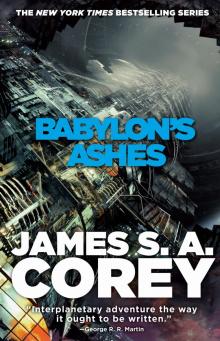 Babylon's Ashes
Babylon's Ashes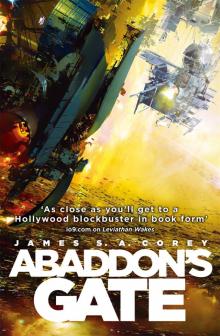 Expanse 03 - Abaddon’s Gate
Expanse 03 - Abaddon’s Gate Tiamat's Wrath
Tiamat's Wrath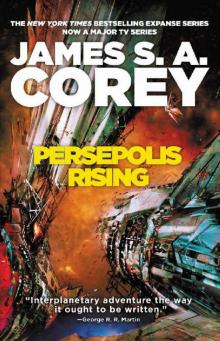 Persepolis Rising
Persepolis Rising The Butcher of Anderson Station
The Butcher of Anderson Station The Churn
The Churn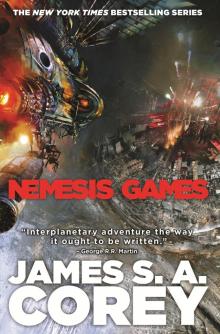 Expanse 05 - Nemesis Games
Expanse 05 - Nemesis Games Strange Dogs
Strange Dogs Honor Among Thieves: Star Wars
Honor Among Thieves: Star Wars Cibola Burn
Cibola Burn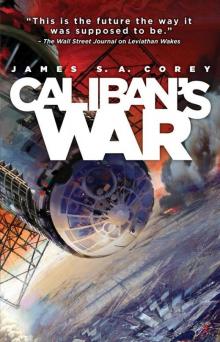 Caliban's War
Caliban's War The Vital Abyss
The Vital Abyss Auberon
Auberon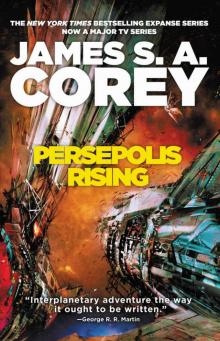 Persepolis Rising (The Expanse)
Persepolis Rising (The Expanse)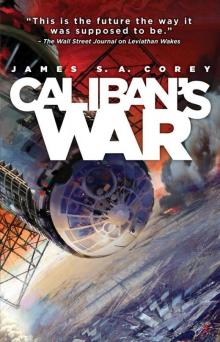 Caliban's War: Book Two of the Expanse series
Caliban's War: Book Two of the Expanse series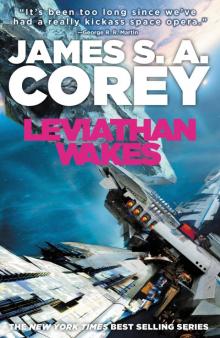 Leviathan Wakes: Book One of The Expanse
Leviathan Wakes: Book One of The Expanse Cibola Burn (Expanse)
Cibola Burn (Expanse) Strange Dogs (Expanse)
Strange Dogs (Expanse) The Vital Abyss: An Expanse Novella (The Expanse)
The Vital Abyss: An Expanse Novella (The Expanse)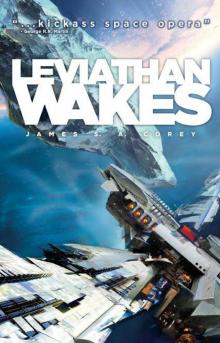 Leviathan Wakes e-1
Leviathan Wakes e-1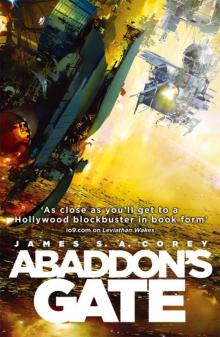 Abaddon's Gate e-3
Abaddon's Gate e-3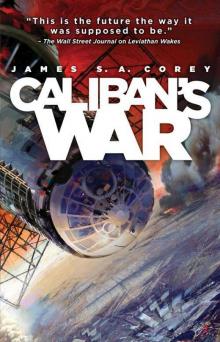 Caliban;s war e-2
Caliban;s war e-2 Gods of Risk: An Expanse Novella
Gods of Risk: An Expanse Novella Honor Among Thieves: Star Wars (Empire and Rebellion)
Honor Among Thieves: Star Wars (Empire and Rebellion)